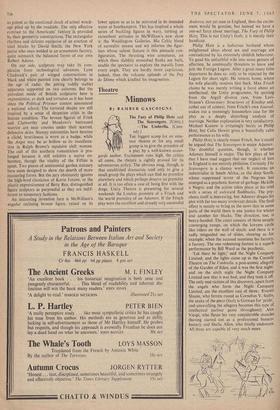Theatre
Minnows
By BAMBER GASCOIGNE
The Fury of Philip Hotz and The Scavengers. (Unity.) —The Umbrella. (Com- edy.) THE' biggest scoop for an ama- teur theatre or for any small group is to give the premiere of a play by a well-known avant- garde author. Excitement runs high, the critics all come, the theatre is rightly praised for its adventurous policy. The obvious snag, though, is that established dramatists tend only to give a small group the plays which can find no premiere elsewhere and which perhaps deserve no premiere at all. It is too often a case of being first with the dregs. Unity Theatre is presenting for several weekends the London premiere of a Frisch and the world premiere of an Adamov. if the Frisch play were the excellent and already very successful Andorra, not yet seen in England, then the excite- ment would be genuine, but instead we have a one-act farce about marriage, The Fury of Philip Hotz. This is not Unity's fault; it is merely their handicap.
Philip Hotz is a ludicrous husband whose enlightened ideas about sex and marriage are contradicted by his extremely childish behaviour. To goad his unfaithful wife into some gesture of affection, he continually threatens to leave and join the Foreign Legion. After a great many false departures he does so, only to be rejected by the Legion for short sight. He returns home, where his wife placidly receives him back. Max Frisch claims he was merely writing a farce about an intellectual; the Unity programme, by quoting from the Argyll divorce case, from Levi- Strauss's Elementary Structures of Kinship and, rather out of context, from Frisch's own Journal, makes out a stunningly humourless case for the play as a deeply disturbing analysis of marriage. Neither explanation is very satisfactory. Michael Kustow is irritatingly hectic as Philip Hotz, but Celia Hewitt gives a beautifully calm performance as his wife.
Philip Hotz is clearly minor Frisch, but it could be argued that The Scavengers is major Adamov. The doubtful question, though, is whether Adamov himself is major. The few plays of his that I have read suggest that our neglect of him in England is not entirely philistine. Certainly The Scavengers is a clumsy work. It concerns an industrialist in South Africa, or the deep South, whose suppressed terror of the Negroes has emerged as a psychotic horror of garbage. He kills a Negro; and the action takes place at his trial with a series of awkward flashbacks. The psy- chosis itself is interesting, but Adamov drapes his plot with far too many irrelevant details. The final effect is merely to bring us the news that in some parts of the world there is one justice for whites and another for blacks. The direction, too, is heavy-handed. The court consists of three steeply converging ramps, on which the lawyers circle like riders on the wall of death; and there is a sadly misguided use of slides, showing us for example, when the accused mentions his factory, a factory. The one redeeming feature is a superb performance by Bill Ward as the psychotic.
`Let there be light,' said the Night Company Limited; and the lights came up at the Comedy
Theatre on The Umbrella, a post-atomic allegory
of the Garden of Eden, and it was the first night; and on the sixth night the Night Company
Limited saw that it was bad; and they took it off.
The only real victims of this discovery, apart from the angels who form the Night Company
Limited, are the excellent cast of three : Everett
Sloane, who ferrets round as Cornelius V. Stotts, the snake of the piece (Stolz is German for 'pride,
and unravelling the allegory becomes this type of intellectual parlour game throughout); Alex Viespi, who flexes his very considerable muscles (having started out as a professional bronco- buster); and Sheila Allen, who finally undresses. All three are capable of very much more.










































 Previous page
Previous page